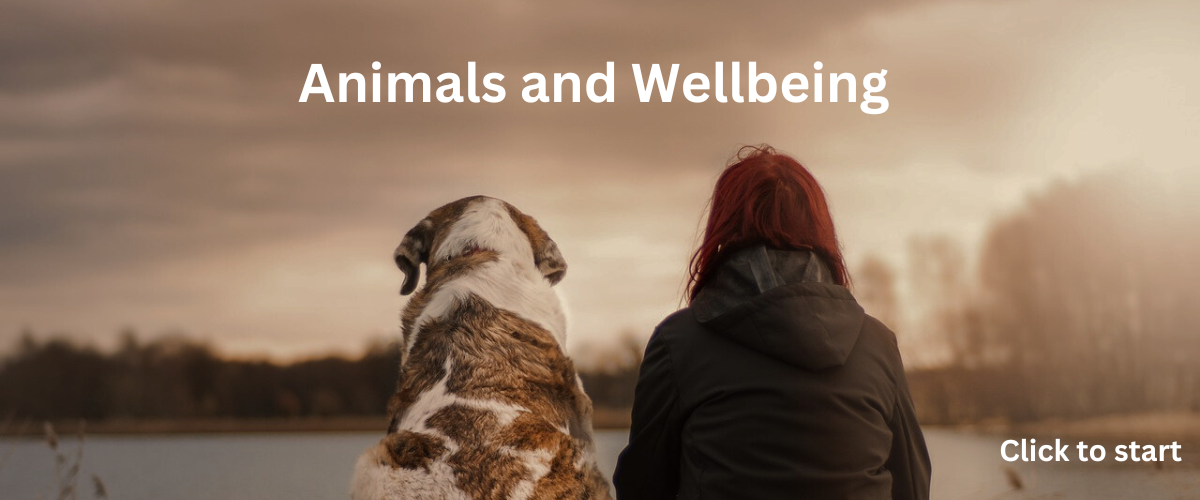This course discusses a variety of topics related to loneliness including:
- What loneliness is and what impact it can have.
- Why some people are more likely to experience loneliness.
- What could have contributed to the loneliness increase in society?
- Feeling lonely in a crowd.
- Tips for if you are feeling lonely.
- How to support someone who is feeling lonely.
- The benefit that periods of solitude can sometimes have.
This course discusses all things animals and wellbeing. It begins by looking at the domestication of animals and then continues to look at whether animals can think, feel, and understand human emotions and why that matters to us. It further discusses the impact that pets can have on our recovery, ways to be around animals if you don't have a pet and the benefit that working animals can have. The course concludes by providing examples of famous stories of animals and the impact that they had.

This course explores the topic of health, wellbeing, and employment. It discusses what wellbeing is, the Five Ways to Wellbeing and, ways you could integrate these into your working and non-working life. It also includes tips to prioritise your health and wellbeing including strategies for working from home, looking after your mental health, setting boundaries, working in a team, and seeking support.
This course looks at lifestyle in relation to recovery using a holistic model.
Current topics include:
- Introduction to Lifestyle & Recovery
- Sleep & Relaxation
- Nutrition & Wellbeing
- Exercise & Recovery
- Drugs & Alcohol
- Mindfulness of Daily Life
- The Role of Goal Setting
This course explores what stress is, the physical and psychological impact of the stress response, the stress vulnerability bucket model, basic coping theory, everyday ways of coping, how genetics and the environment influence our vulnerability to stress and what can help when dealing with stress.
This course explores the various complementary and alternative therapy treatments available today, including Aromatherapy, Traditional Chinese medicine, Light therapy and Yoga.
The course includes the history of each therapy, how they work and how to access them.
This course considers different types of loss and how it might make you feel. It explores the process of dealing with loss and how you can help yourself or someone else. It also considers different cultural and religious perspectives on loss.
This course explores the role art and museums can have on mental wellbeing and recovery. There is emerging evidence that suggests that accessing art and museums can have positive health and wellbeing outcomes for people, and that they play a role in helping people to stay well and recover faster, including mental health. The course considers how to get the most out of art and museums to support your wellbeing.
This course starts by exploring the many different types of writing and the background to writing and wellbeing. It will tell you about the ways that writing can support your sense of wellbeing or aid your mental health recovery. It gives lots of examples of how you can get started with writing and also some of the things you might want to consider when you do.
Singing for wellbeing explores how singing works, why it is beneficial to our wellbeing, and how you can get involved with singing too.
Running for Recovery explores the health and wellbeing benefits of running.
This course looks at the benefits of being in nature on our mental health and wellbeing and whether it is always helpful. For people who want to increase their interaction with nature, it uses the Five Ways to Wellbeing structure to discuss ways to connect with nature, take notice in nature, be active in nature, learn in and about nature and give to nature. It will also discuss ways that people who are unable to get outdoors can still benefit from natures qualities. The course is heavily influenced by lived experience examples.
Resilience is often described as our ability to keep going after facing difficult situations. However, resilience is more than bouncing back, it is also about our ability to adapt when faced with challenging circumstances, whilst maintaining mental
wellbeing. This course explores psychological resilience and gives some ideas of how to develop it.
This course will discuss what a routine is and the positives and negatives of having a routine. It will also look at how to create habits and build routines using habit stacking, the CHIME factors and the Cycle of Change. Finally, it will give examples of morning and evening routines and some tips to help you to create a routine.
For many students, starting university will mean living away from home for the first time. You may come across situations which are new to you, which could trigger some feelings of stress.
This course looks at the transition to university, being a student and how to look after yourself with an emphasis on taking care of your wellbeing and how to ask for help. It has been co-created with Teesside University.